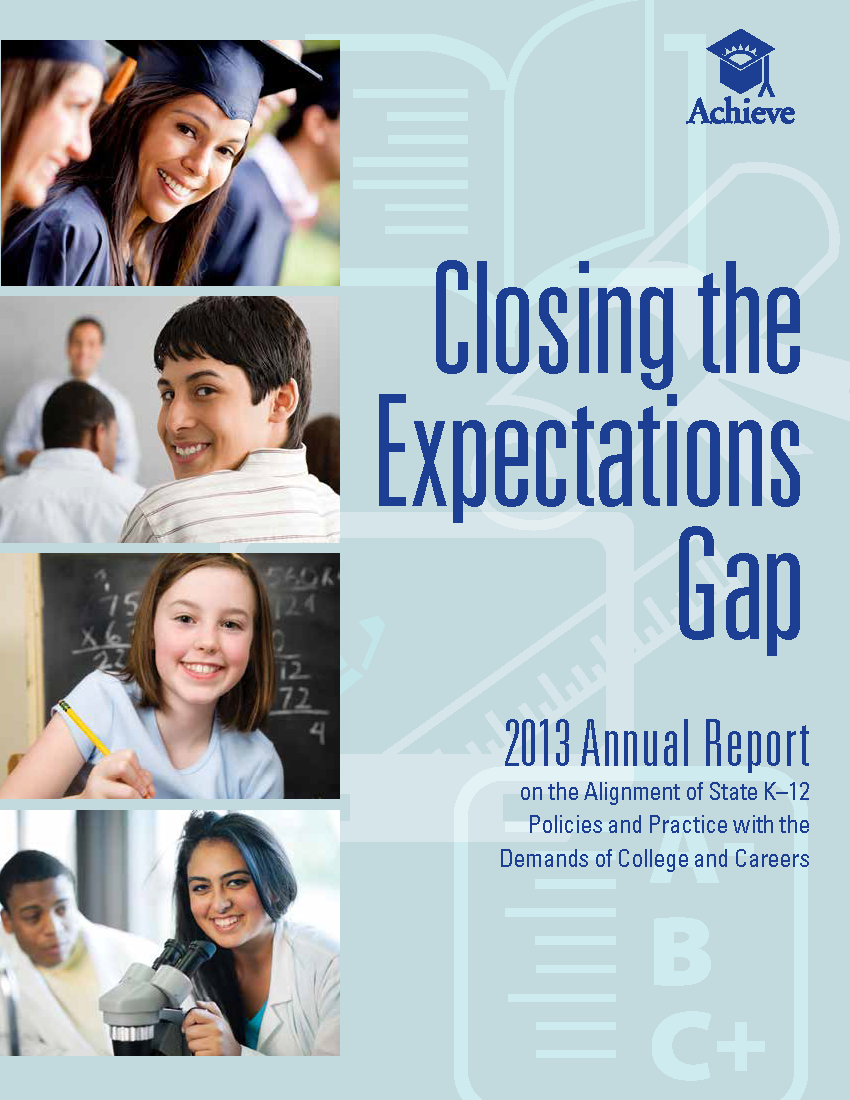All students should graduate from high school ready for college, careers, and citizenship.

New Report Details States' Progress on College and Career Readiness
Washington, D.C. - November 20, 2013 - With all 50 states and the District of Columbia having adopted college- and career-ready standards, Achieve's eighth annual "Closing the Expectations Gap" report, released today, shows how all states are aligning those standards with policies and practice to better ensure that all students are academically prepared for life after high school.
"All 50 states deserve credit for confronting the expectations gap - that is the gap between what it takes to earn a high school diploma and what the real world actually expects graduates to know and be able to do," said Mike Cohen, Achieve's president. "But raising standards is just the start. Supporting teachers and leaders with the time and tools they need to change classroom practice is critical, and many states are doing just that. It is also important to align graduation requirements, assessments and accountability policies to college- and career-ready standards. This work is complicated and it will take time to get it right. Governors, chiefs and other state and districts leaders must continue to make the work a top priority; they deserve tremendous credit for leading on an issue that is so critical to the future of students, their families, communities, states and ultimately our country."
Achieve conducts an annual policy survey that asks all 50 states and the District of Columbia whether they have adopted standards, graduation requirements, assessments and accountability systems aligned to the expectations of two- and four-year colleges and employers. The national survey of state education leaders has measured the same areas of reform each year since the National Governors Association and Achieve co-sponsored the National Education Summit in 2005. This year's survey reveals the following results:
Standards: All 50 states and the District of Columbia have adopted standards aligned to the expectations of college and careers. 46 states and DC have adopted the Common Core State Standards, while four have state-developed CCR standards. For these standards to be realized in classrooms, they must be implemented with fidelity. Ensuring access to high-quality aligned instructional materials and supporting training and professional learning opportunities for teachers and principals is critical - as is deploying strong performance metrics to monitor implementation progress.
Graduation Requirements: Today, 19 states and the District of Columbia have adopted college- and career-ready graduation requirements. However, more than half the states in the country that have adopted the CCSS/CCR standards have not raised their graduation requirements to match those standards. This misalignment means that students may graduate unprepared for college and careers since they will not have taken courses that deliver the CCSS/CCR standards or demonstrated their mastery of the CCSS/CCR standards through competency-based methods.
Assessments: Today, 19 states have or will administer college- and career-ready high school assessments capable of producing a readiness score that postsecondary institutions use to make placement decisions. The 42 states and District of Columbia participating in the Partnership for Assessment of Readiness for College and Careers (PARCC) or the Smarter Balanced Assessment Consortium working to develop CCR assessments will face many key decisions in the months and years ahead, including how these next generation assessments can support aligned and rigorous instruction, how to ensure postsecondary use of the results, and how and whether to factor the results of new assessments into high-stakes graduation decisions for students.
Accountability: A majority of states, 35, have now incorporated at least one of four accountability indicators that Achieve has identified as critical to promoting college and career readiness. No state meets Achieve's criteria regarding the use of all indicators in its college- and career-ready accountability system, and overall state progress in creating accountability systems anchored in CCR has been slow - and often stalled - even with the adoption of new accountability systems under ESEA flexibility waivers.
Cohen also pointed to the sharing of a common set of standards by 46 states and the District of Columbia that has produced unprecedented cross-state collaboration to address many implementation issues. He went on to say, "The next few years will be challenging for the college- and career-ready agenda and we have to stay the course. Those who are against the CCSS or CCR standards, better assessments, aligned graduation requirements, and accountability systems that value college and career readiness are, in fact, champions of the status quo. A status quo that graduates far too few and fails to prepare many who do receive a diploma for the real world."
To see the report, go to www.achieve.org/ClosingtheExpectationsGap2013.
MEDIA CONTACT: Chad Colby (202) 419-1570, ccolby@achieve.org

